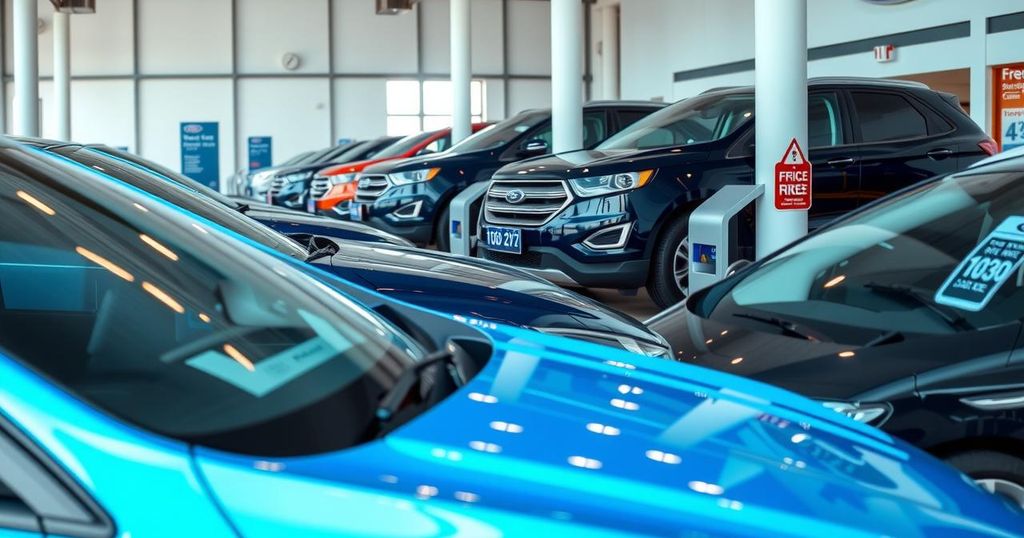Ford Raises Prices on Vehicles Amid Tariff Concerns
Ford has announced price increases for the Mustang Mach-E, Maverick, and Bronco Sport, affected by tariffs imposed by President Trump. These changes will result in as much as a $2,000 increase on some models. Ford anticipates a $2.5 billion increase in costs due to tariffs, affecting the pricing landscape for consumers.
Ford Motor Company has officially increased the prices on three vehicles produced in Mexico. This adjustment, which comes as one of the first significant responses from a major automaker to President Donald Trump’s tariffs on auto imports, affects the Mustang Mach-E, the Maverick pickup, and the Bronco Sport. The new pricing structure went into effect for vehicles manufactured starting May 2, as reported by Reuters.
These price hikes could amount to as much as $2,000 on certain models, as per internal notices shared with dealers that Reuters has reviewed. In terms of availability, Ford is indicating that these newly priced cars will start arriving at dealer lots in late June. The exact implications for consumers will become clearer as these vehicles hit the market.
The ramifications of Trump’s tariffs extend beyond just Ford, as the company estimates that by 2025, the trade war could add approximately $2.5 billion in overall costs. Fortunately for Ford, it anticipates being able to lessen that impact by about $1 billion. General Motors similarly highlighted a grim picture last week, projecting that the tariffs could cost it between $4 billion and $5 billion, although it hopes to mitigate that by at least 30 percent.
This ongoing tariff situation has triggered significant instability within the auto industry. With many automakers, both American and European, altering forecasts and suspending production at certain plants, the ripple effects are clearly being felt. Trump only slightly eased tariffs on foreign auto parts recently by providing credits that reflect domestic production. Still, the heavier 25-percent tariff on around 8 million imported vehicles remains untouched.
Ford appears to be in a healthier position relative to some competitors due to its robust US manufacturing operations, with 79 percent of its sold vehicles produced domestically. In contrast, General Motors has only 53 percent of its US-sold vehicles manufactured in the States, according to findings from Barclays.
Aside from tariffs on Mexican-made vehicles, the companies also confront substantial duties on imports from South Korea and China. General Motors has indicated that tariffs related to its Korean imports cost around $2 billion, while Ford has not provided specifics regarding its expenses tied to Chinese imports.
With pricing pressures mounting, numerous automakers, including Toyota and GM, are increasingly reliant on efficient domestic and international operations. Data from S&P Global Mobility indicates that many major companies import over 40 percent of the vehicles they sell in the U.S. In fact, Volkswagen and Hyundai reportedly import more than 60 percent.
Prior to Ford’s decision, most automakers had refrained from such price increases but had warned they could be forthcoming. For instance, Porsche has indicated it may have to raise selling prices if tariffs persist, while Audi has hinted at similar possibilities without providing specifics. Conversely, BMW offers a more optimistic outlook, suggesting a potential decline in US car tariffs starting in July based on discussions with US officials. Notably, GM’s finance chief recently stated confidence in the current pricing environment, suggesting no imminent increases were anticipated.
To summarize, Ford’s decision to raise prices for certain vehicles manufactured in Mexico underscores the broader impact of President Trump’s tariffs on the auto industry. With significant costs projected for both Ford and General Motors, the overall landscape remains fraught with uncertainty. As consumers likely feel the effects of these price increases, the strategies of automakers in navigating tariffs will be vital in how they adapt moving forward.
Original Source: www.aljazeera.com




Post Comment